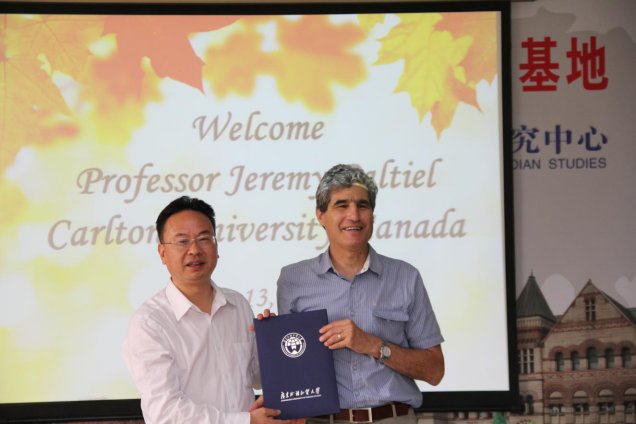13th June——Professor Jeremy Paltiel from the Department of Political Science of Carleton University visited CCS.
Professor Paltiel briefly introduced the policies after Trudeau took office and pointed out that Sino-Canada relations are now facing a golden period given that Trump’s election shocked not only Canada but also the world.
Professor Paltiel argued that the Trudeau government made progressive contributions to restore Canada’s status in the world under the notion of “Canada’s back”. In areas of global cooperation to address climate change, strengthening security coordination with allies in NATO, taking refugees in a more inclusive manner, advancing Canada’s contribution to peacekeeping, CETA negotiation with EU, FTA negotiation with China, etc. During the time of Obama, Trudeau and Obama developed a very close relation (Bromance) and Canada-US relations at that time were quite cozy and cordial. The election result with Trump sworn in gave the world no small deal of shock. After Trump assumed office, he started the re-negotiation of NAFTA, withdrew from TPP, attacked NATO and Canada’s contribution, flouted the Paris Agreement, increased tax on lumber,etc. Canada tried every possible means to save the most important bilateral relations with America by inviting Ivanka to the summit on women in order to influence Trump and also by getting Brian Mulroney to rein Trump in. However, all these efforts entail time and energy and it seems not very likely to see a positive outcome any time soon. This makes the advancement of Sino-Canada relation possible, albeit some irritant issues exist. As a self-proclaimed middle power, Canada does not have so many options. In the time of Donald Trump, Canada needs to re-emphasize multilateral relations and preserve a rule-based world order by promoting Canadian values and working with like-minded countries.
After the discussion, director of CCS—Tang Xiaosong delivered a letter of appointment to Professor Paltiel as an adjunct professor of CCS.

